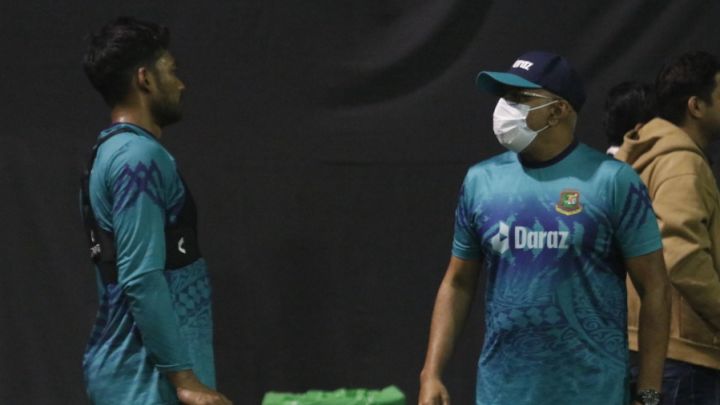The ICC says it is monitoring the situation ahead of the World Cup match on November 6
Andrew Fidel Fernando

Sri Lanka cancelled their training session in Delhi on Saturday afternoon following advice from team doctors, owing to the severe air pollution in the city. Bangladesh, however, trained from 6pm onwards on Saturday evening, having called off their practice on Friday.
The two teams are scheduled to play their World Cup league match in Delhi on Monday.
As the air quality index (AQI) rose above 400, an ICC spokesperson told ESPNcricinfo that the situation was being monitored. “The ICC and our hosts the BCCI take the well-being of all participants seriously and are monitoring the air quality in Delhi,” they said. “We are taking expert advice to assess the situation.”
It is understood that as the nearest air-quality measuring station is more than a kilometre from the Arun Jaitley Stadium, BCCI staff has been taking readings from handheld devices at the ground itself. They will continue to do this over the next two days to determine whether the air quality is at a safe level for play.
According to the ICC’s guidelines on air quality, as well as a pulmonologist (lung specialist) who the organisers have been consulting, an AQI reading of below 200 is considered safe for play in most cases. A higher AQI could put play in jeopardy but it is only a guideline rather than a hard cut-off.
The organisers will also undertake mitigation measures such as turning on the sprinklers before play, which is expected to help lower pollution levels in the immediate vicinity. They will also ask players to remain inside their dressing rooms, where air purifiers will be operational, rather than in the dugout.
The Indian government agency’s Air Quality Tracking Warning system said the AQI was likely to be in the severe category on Saturday and remain so until Tuesday, November 7. ESPNcricinfo understands that on Monday, the match officials will treat the air pollution just as they would the weather, in deciding whether conditions are fit for play or not.
Bangladesh chose to train on Saturday evening after cancelling Friday’s session because of the air pollution. Their head coach Chandika Hathurusinghe was seen wearing a mask during practice.
“Due to worsening conditions, we didn’t take the chance,” Bangladesh’s team director Khaled Mahmoud had said after the cancellation of Friday’s session. “We have two more training days. Some of us developed coughing, so there’s a risk factor. We don’t want to get sick. We don’t know if things will improve, but we have training tomorrow. We want all the players to be fit for the important game coming up on November 6.”
An air emergency was declared in Delhi on Thursday, as the air quality index (AQI) rose above 400 in several places in the city, forcing the government to close schools for two days and impose restrictions on construction and vehicle traffic.
Several of the players in Sri Lanka’s squad have already experienced playing cricket in polluted Delhi airwhen they played a Test at this venue in late 2017. On that occasion, several players had come off the field to vomit in the dressing room, while others received on-field medical attention for respiratory problems. At least five Sri Lanka fielders had also come out to field in masks.
Earlier this week, ahead of India’s World Cup match against Sri Lanka, Rohit Sharma had expressed concern over the worsening air quality in Mumbai, and elsewhere in the country, saying it is important to ensure that future generations can live “without any fear” in India. On the same day, the BCCI said it would not allow any fireworks displays for the remaining games in Mumbai and Delhi because of the air-quality issue.
Andrew Fidel Fernando is ESPNcricinfo’s Sri Lanka correspondent. @afidelf






